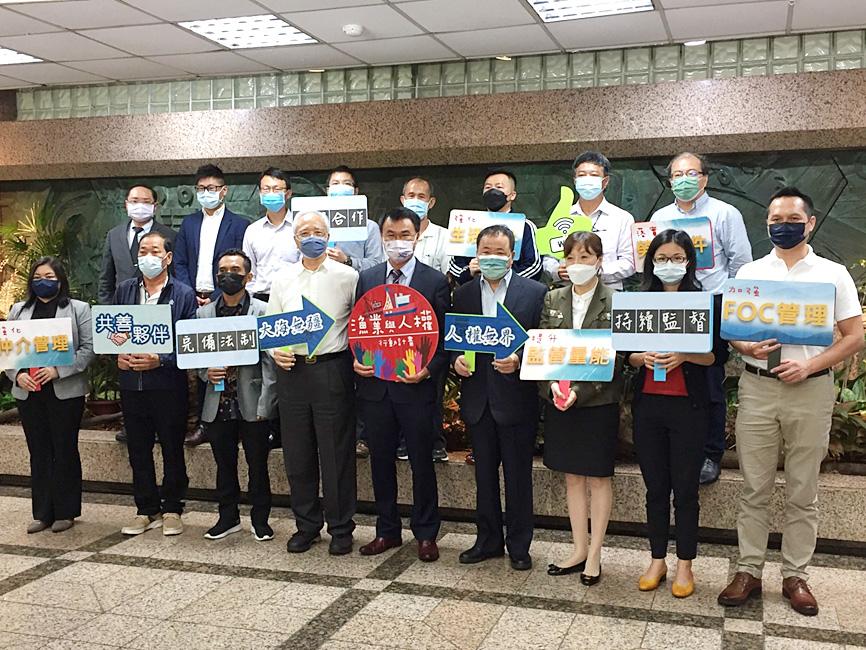The minimum monthly wage for migrant fishers working on Taiwanese-owned distant-water fishing vessels is to be increased by US$100 with effect from July, the Council of Agriculture (COA) said yesterday.
The Cabinet approved the minimum wage hike on Thursday as part of a broader plan to improve working conditions for migrant fishers, the council said.
The plan is to raise the monthly minimum pay for that category of migrant fisher from US$450 to US$550, the COA said, adding that there are about 21,000 migrant workers onboard Taiwanese-owned distant-water fishing vessels.

Photo: CNA
The salaries must be paid directly to the fishers instead of through an employment agency, and the workers have the right to contact the COA if their employers fail to adhere to that regulation, Fisheries Agency Director-General Chang Chih-sheng (張致盛) said.
Under the plan, the government has made it mandatory for migrant fishers on such vessels to have medical insurance coverage of at least NT$300,000 (US$10,253), while their accident insurance coverage has been increased from NT$1 million to NT$1.5 million.
Furthermore, crews would no longer be permitted to remain at sea for more than 10 consecutive months.
The plan was devised to improve livelihoods and human rights in the industry, the COA said.
To that end, the COA said it would step up inspections of Taiwan’s approximately 1,100 distant-water fishing vessels and encourage owners to install closed-circuit TV systems onboard to allow better monitoring of work conditions.
Port inspections would be conducted not just on Taiwan-flagged fishing vessels, but also on Taiwanese-owned boats flying a foreign flag, known as flags of convenience, it said.
Taiwan Deepsea Tuna Longline Boatowners and Exporters Association president Lin Yu-chih (林毓志) yesterday said that the new rules have given fishing boat owners pause, with some reconsidering whether to continue in the industry.
High wages for crewmembers on deep-sea fishing expeditions already weigh heavily on owners, as wages comprise 30 percent of overheads, Lin said, adding that the COVID-19 pandemic and the Russia-Ukraine war have increased owners’ expenditures, especially for fuel.
Prior to the pandemic and the war, at-sea refueling usually cost about US$100 per tonne of fuel, but, for example, it now costs US$1,380 per tonne of fuel to resupply in Argentina, he said.
Every fishing boat owner — regardless of the size of the ship — is losing money the moment the ship leaves harbor, he said.
On top of expenditures, deep-sea fish, such as tuna, are not fetching ideal prices, and in the case of restaurants having closed through the entirety of last year, fish are being sold at rock-bottom prices, he said.
However, despite the difficulties, Lin said that he would support the project because the industry wants to expand abroad.
Moreover, he is touched by the hard work of the government, he said.
COA Minister Chen Chi-chung (陳吉仲) said that the council would offer subsidies amid the industry transition.
A total of NT$640 million would be used to promote and uphold human rights in the industry, while the COA would spend NT$2 billion over four years to improve crew members’ rights, Chen said.

Taiwan has received more than US$70 million in royalties as of the end of last year from developing the F-16V jet as countries worldwide purchase or upgrade to this popular model, government and military officials said on Saturday. Taiwan funded the development of the F-16V jet and ended up the sole investor as other countries withdrew from the program. Now the F-16V is increasingly popular and countries must pay Taiwan a percentage in royalties when they purchase new F-16V aircraft or upgrade older F-16 models. The next five years are expected to be the peak for these royalties, with Taiwan potentially earning

STAY IN YOUR LANE: As the US and Israel attack Iran, the ministry has warned China not to overstep by including Taiwanese citizens in its evacuation orders The Ministry of Foreign Affairs (MOFA) yesterday rebuked a statement by China’s embassy in Israel that it would evacuate Taiwanese holders of Chinese travel documents from Israel amid the latter’s escalating conflict with Iran. Tensions have risen across the Middle East in the wake of US and Israeli airstrikes on Iran beginning Saturday. China subsequently issued an evacuation notice for its citizens. In a news release, the Chinese embassy in Israel said holders of “Taiwan compatriot permits (台胞證)” issued to Taiwanese nationals by Chinese authorities for travel to China — could register for evacuation to Egypt. In Taipei, the ministry yesterday said Taiwan

‘LIKE-MINDED PARTNER’: Tako van Popta said it would be inappropriate to delay signing the deal with Taiwan because of China, adding he would promote the issue Canadian senators have stressed Taiwan’s importance for international trade and expressed enthusiasm for ensuring the Taiwan-Canada trade cooperation framework agreement is implemented this year. Representative to Canada Harry Tseng (曾厚仁) in an interview with the Central News Agency (CNA) said he was increasingly uneasy about Ottawa’s delays in signing the agreement, especially as Ottawa has warmed toward Beijing. There are “no negotiations left. Not only [is it] initialed, we have three versions of the text ready: English, French and Mandarin,” Tseng said. “That tells you how close we are to the final signature.” Tseng said that he hoped Canadian Prime Minister Mark Carney

The US’ joint strikes with Israel on Iran dismantled a key pillar of China’s regional strategy, removing an important piece in Beijing’s potential Taiwan Strait scenario, said Zineb Riboua, a senior researcher at the Hudson Institute’s Center for Middle East Peace and Security. In an article titled: “The Iran Question Is All About China,” Riboua said that understanding the Iran issue in the context of China’s “grand strategy” is essential to fully grasp the complexity of the situation. Beijing has spent billions of dollars over the years turning Iran into a “structural strategic asset,” diverting US military resources in the